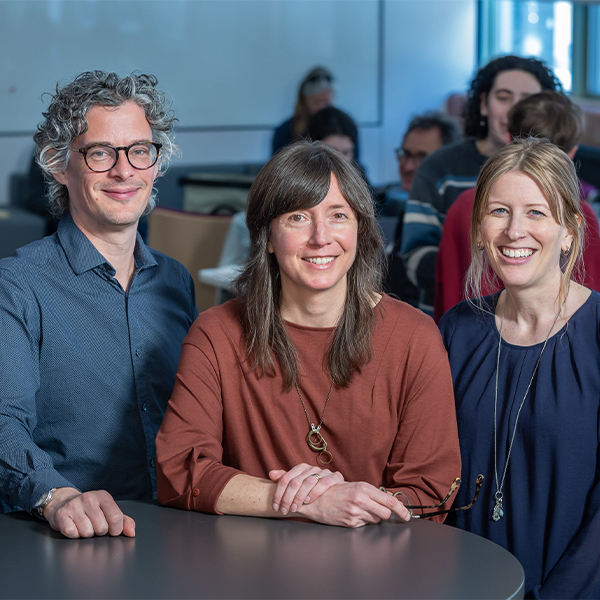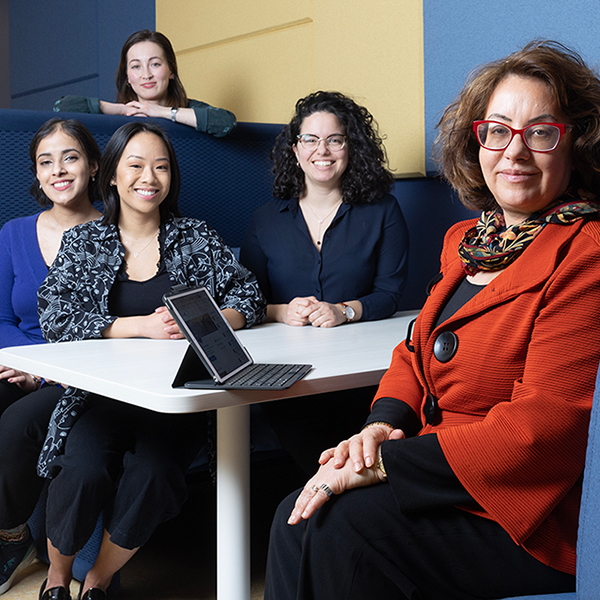Vivek Venkatesh, McGill’s new dean of education, recently invited me to watch him take part in an event at Concordia University. And while university deans participate in events at academic institutions all the time, this one was a little out-of-the-ordinary.
Venkatesh is a member of BANAL, a multimedia arts collective/instrumental dark pop-metal band. Their performance was loud, almost invasively so, designed to explore extremes and put audiences at the edge of discomfort.
The next week, Venkatesh was in his new office at McGill’s Faculty of Education, puzzling over which shelves would hold the weight of his hundreds of LPs. He’d also brought in some of his guitars, a turntable, analog synthesizers and a sound system, so he can jam now and then (which he’ll do with headphones on – those in neighbouring offices have nothing to fear).
And while he might have founded Grimposium, an international touring festival that explored the extreme metal scene, he describes his musical tastes as varied with ’80s new wave and jazz fusion being anchors for his own musical explorations.
Venkatesh has more than 70 scholarly papers to his name, but his academic work also encompasses less conventional forms of expression. He has founded no fewer than four musical art collectives. The guitars and synthesizers in his office play an essential role in his research-creation endeavours.
He is also a multimedia artist and a filmmaker (his most recent project, Where in the Hell is the Lavender House? is a mockumentary about Longmont Potion Castle, an infamous prank caller with a surreal sense of humour and a cult following).
In his academic work, Venkatesh focuses on the creation of public pedagogical and artistic spaces for pluralistic dialogue. He is nearing the end of his second term as the UNESCO Co-Chair in the Prevention of Radicalisation and Violent Extremism.
“We [are quick to] mock those with whom we disagree. And it takes away from us discussing precisely what’s happening.”
Dean of Education Vivek Venkatesh
Venkatesh is painfully familiar with how extremist beliefs can lead to terrible acts of violence. His beloved cousin was one of the victims of the Air India Flight 182 terrorist bombing in 1985 that killed all 329 people on board, the majority of them Canadians.
“That’s what really shaped my own philosophy around education,” Venkatesh says. He wants to “build spaces for pluralism, overcoming these feelings of anguish and resentment and hatred.”
But in order to do that effectively, Venkatesh says we have to understand where those charged emotions spring from and how they curdle into extremist views. “How do we learn to hate?” he asks. It is a question that drives much of his work.
“I’m hoping we discover a way to pierce our silos and listen in on another group without necessarily intervening on that discussion.” Educators need to be able to understand the underpinnings for even reprehensible belief systems. “It’s not to excuse it, it’s not for us to say we agree,” says Venkatesh.
Venkatesh was the driving force behind Project SOMEONE (SOcial Media EducatiON Everyday), an ambitious multi-media online platform founded in 2014 that used digital literacy and education in innovative ways to combat discrimination and hate speech, and to foster community resilience against radicalization.
Project SOMEONE was involved in workshops and training programs in more than a dozen countries and its site attracted more than 150,000 visitors from around the world. One of its many projects involved documentary-based interventions that offered police in Val d’Or and Indigenous communities in Lac Simon the opportunity to engage with one another.
While the project has now ceased operations (much of its activities were folded into the UNESCO Chair), it still exists as a public resource and is chockablock with tools from comics to video interviews to webinars.
The well-travelled Venkatesh was born in India, and spent parts of his youth there, in Venezuela, and in the U.S. English is his first language, French his second (he learned both in India). He reads and writes Hindi and Marathi and speaks Urdu and Spanish.
Venkatesh went to Singapore on a scholarship for high school and stayed there for his university studies at the National University of Singapore, where he met a McGill law student taking part in an exchange program.
As things got serious between the two (they eventually married), he came up with a plan to help them manage their long-distance relationship. He enrolled in an education program (he had already earned an undergraduate degree in computer science), reasoning that a teaching career would allow for more time together since he would have the summers off.
He moved to Montreal in 2000 and earned master’s and doctoral degrees in educational technology at Concordia, where he studied cognition and worked on mathematical models for understanding how people think and learn.
He joined the faculty at Concordia, eventually becoming a full professor of inclusive practices in visual arts, as well as the chair of Concordia’s Department of Art Education and the director of its Centre for the Study of Learning and Performance.
Venkatesh believes that art plays an essential role in society, building spaces for dialogue. “We can imagine the hyperreal, we can exaggerate, we can explore.” Sometimes that exploration can be uncomfortable.
Last February, Venkatesh and his BANAL partners were invited to perform at an event organized by the Musée d’art contemporain. In preparation for the performance, BANAL asked people to text in recollections of their own shame, that were read out in a karaoke segment of the show. “We tend to impart this judgement of shame on people with whom we disagree, but we rarely think about the things we’re ashamed of that we’ve done.”
Now that he is at McGill (aside from being a new dean, he is also a James McGill Professor in the Department of Integrated Studies in Education), Venkatesh is excited about the broad range of activities within the Faculty – how his colleagues are pursuing projects involving everything from teacher education to philosophy to medicine to science.
He looks forward to collaborating on a new strategic plan for the Faculty. “Something that tells us, ‘Here’s what we’re good at, and here’s how we want to continue to be good at it,’” he says. Venkatesh has his own ideas for the future, “but I want to be mindful about the history and the culture and the experiences of my colleagues.”


